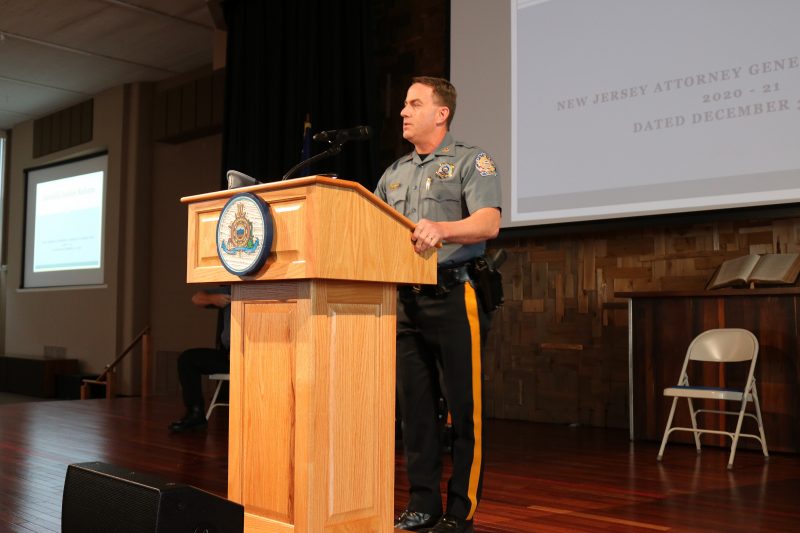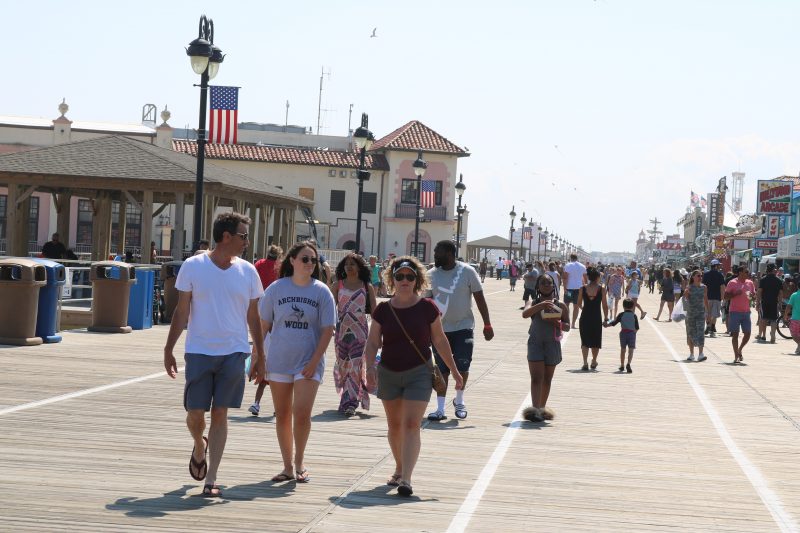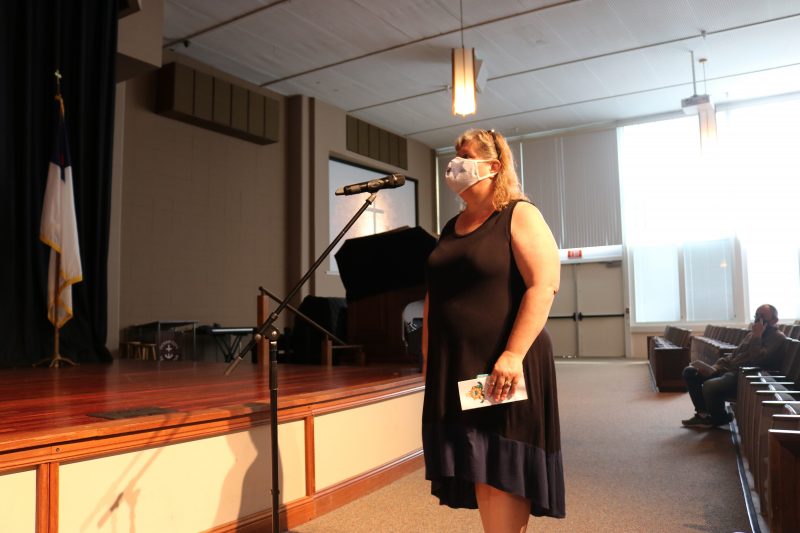Ocean City Police Chief Jay Prettyman tells the audience of the dramatic changes caused by the new marijuana laws.
 By DONALD WITTKOWSKI
Ocean City police officers will have to be extra careful in how they handle juvenile offenders who are smoking pot or drinking alcohol on the beaches, the Boardwalk or other parts of town this summer.
In a dramatic twist, police may be the ones at risk of getting arrested – not the offenders, Police Chief Jay Prettyman said.
New Jersey’s legalization of recreational marijuana this year includes legal restraints that will dramatically change the way officers statewide respond to underage offenders who are smoking pot or drinking alcohol.
“You will very rarely, if ever, see a juvenile charged with a complaint,” Prettyman said during a 90-minute town hall meeting Saturday attended by about 100 residents and members of City Council at the Ocean City Tabernacle.
https://www.youtube.com/watch?v=wLqEKOQhdFA
Video of town hall meeting. (Courtesy of Martin Fiedler of Just Right TV Productions)
Prettyman and Mayor Jay Gillian organized the community meeting to let the public know of the challenges police will face when they are trying to prevent people from smoking pot or drinking alcohol in public places during the traditionally busy summer tourism season.
“We understand this is going to have an impact on our town,” Prettyman told the audience.
In the past, Ocean City officers likely would have taken underage offenders back to the police station and called their parents to come pick them up. Or, the juveniles may have been arrested, depending on the seriousness of the crime, Prettyman said.
But that will be change under the state’s new marijuana laws and juvenile justice reform, he pointed out.
Adding to the difficulties they may encounter, police officers statewide could face arrest themselves for violating a person’s civil rights if they don’t follow the legal provisions of the new marijuana laws, Prettyman said.
Police, for instance, won’t have enough probable cause to search someone if they simply detect the smell of marijuana or alcohol. The person would have to have the cannabis or alcohol in plain sight for police to take action.
For underage offenders, police could give them a written warning or notify their parents that they had been using marijuana or drinking alcohol.
However, if juveniles refuse to give their names to police, the officers would be virtually powerless to do anything. The juveniles could simply walk away, unless they were being investigated for a more serious crime other than smoking pot or drinking alcohol, Prettyman explained.
By DONALD WITTKOWSKI
Ocean City police officers will have to be extra careful in how they handle juvenile offenders who are smoking pot or drinking alcohol on the beaches, the Boardwalk or other parts of town this summer.
In a dramatic twist, police may be the ones at risk of getting arrested – not the offenders, Police Chief Jay Prettyman said.
New Jersey’s legalization of recreational marijuana this year includes legal restraints that will dramatically change the way officers statewide respond to underage offenders who are smoking pot or drinking alcohol.
“You will very rarely, if ever, see a juvenile charged with a complaint,” Prettyman said during a 90-minute town hall meeting Saturday attended by about 100 residents and members of City Council at the Ocean City Tabernacle.
https://www.youtube.com/watch?v=wLqEKOQhdFA
Video of town hall meeting. (Courtesy of Martin Fiedler of Just Right TV Productions)
Prettyman and Mayor Jay Gillian organized the community meeting to let the public know of the challenges police will face when they are trying to prevent people from smoking pot or drinking alcohol in public places during the traditionally busy summer tourism season.
“We understand this is going to have an impact on our town,” Prettyman told the audience.
In the past, Ocean City officers likely would have taken underage offenders back to the police station and called their parents to come pick them up. Or, the juveniles may have been arrested, depending on the seriousness of the crime, Prettyman said.
But that will be change under the state’s new marijuana laws and juvenile justice reform, he pointed out.
Adding to the difficulties they may encounter, police officers statewide could face arrest themselves for violating a person’s civil rights if they don’t follow the legal provisions of the new marijuana laws, Prettyman said.
Police, for instance, won’t have enough probable cause to search someone if they simply detect the smell of marijuana or alcohol. The person would have to have the cannabis or alcohol in plain sight for police to take action.
For underage offenders, police could give them a written warning or notify their parents that they had been using marijuana or drinking alcohol.
However, if juveniles refuse to give their names to police, the officers would be virtually powerless to do anything. The juveniles could simply walk away, unless they were being investigated for a more serious crime other than smoking pot or drinking alcohol, Prettyman explained.
 Although recreational marijuana has been legalized for adults, the laws prohibit it from being smoked in public places such as the Boardwalk.
Police departments in New Jersey must also follow a December 2020 directive from state Attorney General Gurbir Grewal that requires officers to give “curbside warnings” to juveniles who are engaging in minor acts of delinquency instead of detaining or arresting them.
The curbside warnings are part of broader reforms in New Jersey’s justice system “to demonstrate to juveniles that police officers are present to give guidance, direction, and assistance, and not simply to take them into custody,” according to the directive.
New Jersey’s new marijuana laws have legalized the use of recreational pot for adults 21 and older and have decriminalized it for people under that age. Adults are allowed to smoke pot in their homes or on private property. They are not allowed to smoke marijuana in public places, according to state law.
City Council approved a new ordinance in April that includes a blanket ban on marijuana sales in Ocean City. The governing body followed up this month with another ordinance to prohibit the smoking or vaping of marijuana in public places such as the beaches, Boardwalk, parks, playgrounds and outdoor dining areas. The ordinance to ban marijuana smoking in public places is scheduled for a public hearing and final Council vote on May 27.
Ocean City officials have repeatedly expressed concerns that the town’s image as “America’s Greatest Family Resort” could be harmed if marijuana is sold in town and people simply begin smoking pot in popular tourist areas, such as the Boardwalk.
During the town hall meeting, Prettyman and Mayor Gillian assured the audience that the police department will do whatever is possible to prevent marijuana and alcohol from being consumed in public – within the dictates of the new state laws.
“At the end of the day, we are America’s Greatest Family Resort,” Gillian said.
At the same time, he cautioned that there may be “little hiccups” along the way.
Although recreational marijuana has been legalized for adults, the laws prohibit it from being smoked in public places such as the Boardwalk.
Police departments in New Jersey must also follow a December 2020 directive from state Attorney General Gurbir Grewal that requires officers to give “curbside warnings” to juveniles who are engaging in minor acts of delinquency instead of detaining or arresting them.
The curbside warnings are part of broader reforms in New Jersey’s justice system “to demonstrate to juveniles that police officers are present to give guidance, direction, and assistance, and not simply to take them into custody,” according to the directive.
New Jersey’s new marijuana laws have legalized the use of recreational pot for adults 21 and older and have decriminalized it for people under that age. Adults are allowed to smoke pot in their homes or on private property. They are not allowed to smoke marijuana in public places, according to state law.
City Council approved a new ordinance in April that includes a blanket ban on marijuana sales in Ocean City. The governing body followed up this month with another ordinance to prohibit the smoking or vaping of marijuana in public places such as the beaches, Boardwalk, parks, playgrounds and outdoor dining areas. The ordinance to ban marijuana smoking in public places is scheduled for a public hearing and final Council vote on May 27.
Ocean City officials have repeatedly expressed concerns that the town’s image as “America’s Greatest Family Resort” could be harmed if marijuana is sold in town and people simply begin smoking pot in popular tourist areas, such as the Boardwalk.
During the town hall meeting, Prettyman and Mayor Gillian assured the audience that the police department will do whatever is possible to prevent marijuana and alcohol from being consumed in public – within the dictates of the new state laws.
“At the end of the day, we are America’s Greatest Family Resort,” Gillian said.
At the same time, he cautioned that there may be “little hiccups” along the way.
 Mayor Jay Gillian says the city will look to build partnerships with the community to help preserve Ocean City's family-friendly image.
The city will look to educate the public instead of resorting to heavy-handed tactics, Gillian emphasized. The strategy will include reaching out to the community and parents to find ways to engage teenagers before they can get into trouble, Gillian said.
As an example, the mayor pointed to the city’s partnership with a coalition of Ocean City mothers for a bike safety event on May 12 that promoted good relations between the police department and local teenagers. The safety event was in response to groups of rowdy teens riding their bikes through town and on the Boardwalk.
This summer, the police department’s strategy will include a heavier concentration of officers deployed on the Boardwalk. The police department is also hiring nearly 25 percent more seasonal officers this year than it normally does, Prettyman said.
In addition, the mayor has agreed for the city to provide funding to buy body cameras for all of the police officers. The body cameras will allow officers to video their encounters with juveniles and other people, Prettyman said.
There are also plans for the city to install new security cameras on the Boardwalk between Fifth Street and 14th Street this summer to help police keep an eye on things, he announced.
During the town hall meeting, Prettyman took questions from the audience. Interspersed with their questions, members of the audience repeatedly expressed their support for the police department while criticizing the state’s new marijuana laws.
Ocean City resident Dave Liess bluntly called it “the most ridiculous law I’ve ever heard of.” He said the marijuana laws reflect “disrespect” toward police.
“It’s going to be one hell of a summer for you guys,” Liess told Prettyman while referring to the challenges police will face.
Mayor Jay Gillian says the city will look to build partnerships with the community to help preserve Ocean City's family-friendly image.
The city will look to educate the public instead of resorting to heavy-handed tactics, Gillian emphasized. The strategy will include reaching out to the community and parents to find ways to engage teenagers before they can get into trouble, Gillian said.
As an example, the mayor pointed to the city’s partnership with a coalition of Ocean City mothers for a bike safety event on May 12 that promoted good relations between the police department and local teenagers. The safety event was in response to groups of rowdy teens riding their bikes through town and on the Boardwalk.
This summer, the police department’s strategy will include a heavier concentration of officers deployed on the Boardwalk. The police department is also hiring nearly 25 percent more seasonal officers this year than it normally does, Prettyman said.
In addition, the mayor has agreed for the city to provide funding to buy body cameras for all of the police officers. The body cameras will allow officers to video their encounters with juveniles and other people, Prettyman said.
There are also plans for the city to install new security cameras on the Boardwalk between Fifth Street and 14th Street this summer to help police keep an eye on things, he announced.
During the town hall meeting, Prettyman took questions from the audience. Interspersed with their questions, members of the audience repeatedly expressed their support for the police department while criticizing the state’s new marijuana laws.
Ocean City resident Dave Liess bluntly called it “the most ridiculous law I’ve ever heard of.” He said the marijuana laws reflect “disrespect” toward police.
“It’s going to be one hell of a summer for you guys,” Liess told Prettyman while referring to the challenges police will face.
 Deborah Berdel, who owns a rental property in Ocean City, is worried that the new marijuana laws place too many restraints on police.
Another audience member, Deborah Berdel, said she believes police are finding out now that their “hands are tied” while trying to enforce the law.
Berdel lives full time in Hatfield, Pa., and owns a rental property in Ocean City on the 600 block of Ocean Avenue.
In an interview, Berdel said she works with local realtors to rent out her Ocean City property to families. That way, she can prevent rowdy tenants from renting her property, she noted.
Overall, Berdel is worried that Ocean City’s family-friendly reputation could be tarnished by the state’s new marijuana laws.
“I’m concerned that it’s not going to be America’s Greatest Family Resort,” she said in the interview.
Prettyman told the audience that the new marijuana laws and juvenile justice reform have changed the way police officers do their job “180 degrees.”
“It’s probably the most dramatic change we’ve seen in the last 20 years,” he said.
Deborah Berdel, who owns a rental property in Ocean City, is worried that the new marijuana laws place too many restraints on police.
Another audience member, Deborah Berdel, said she believes police are finding out now that their “hands are tied” while trying to enforce the law.
Berdel lives full time in Hatfield, Pa., and owns a rental property in Ocean City on the 600 block of Ocean Avenue.
In an interview, Berdel said she works with local realtors to rent out her Ocean City property to families. That way, she can prevent rowdy tenants from renting her property, she noted.
Overall, Berdel is worried that Ocean City’s family-friendly reputation could be tarnished by the state’s new marijuana laws.
“I’m concerned that it’s not going to be America’s Greatest Family Resort,” she said in the interview.
Prettyman told the audience that the new marijuana laws and juvenile justice reform have changed the way police officers do their job “180 degrees.”
“It’s probably the most dramatic change we’ve seen in the last 20 years,” he said.